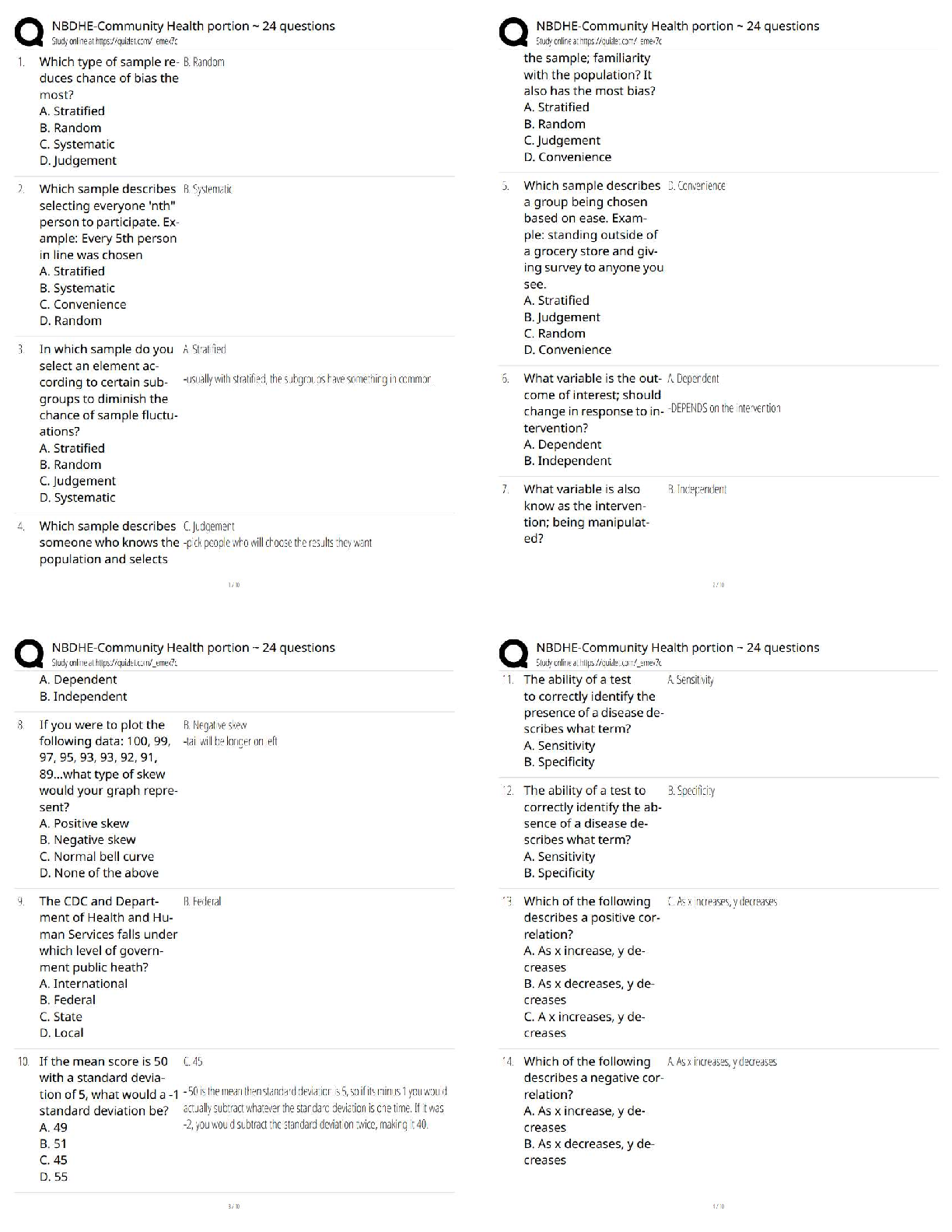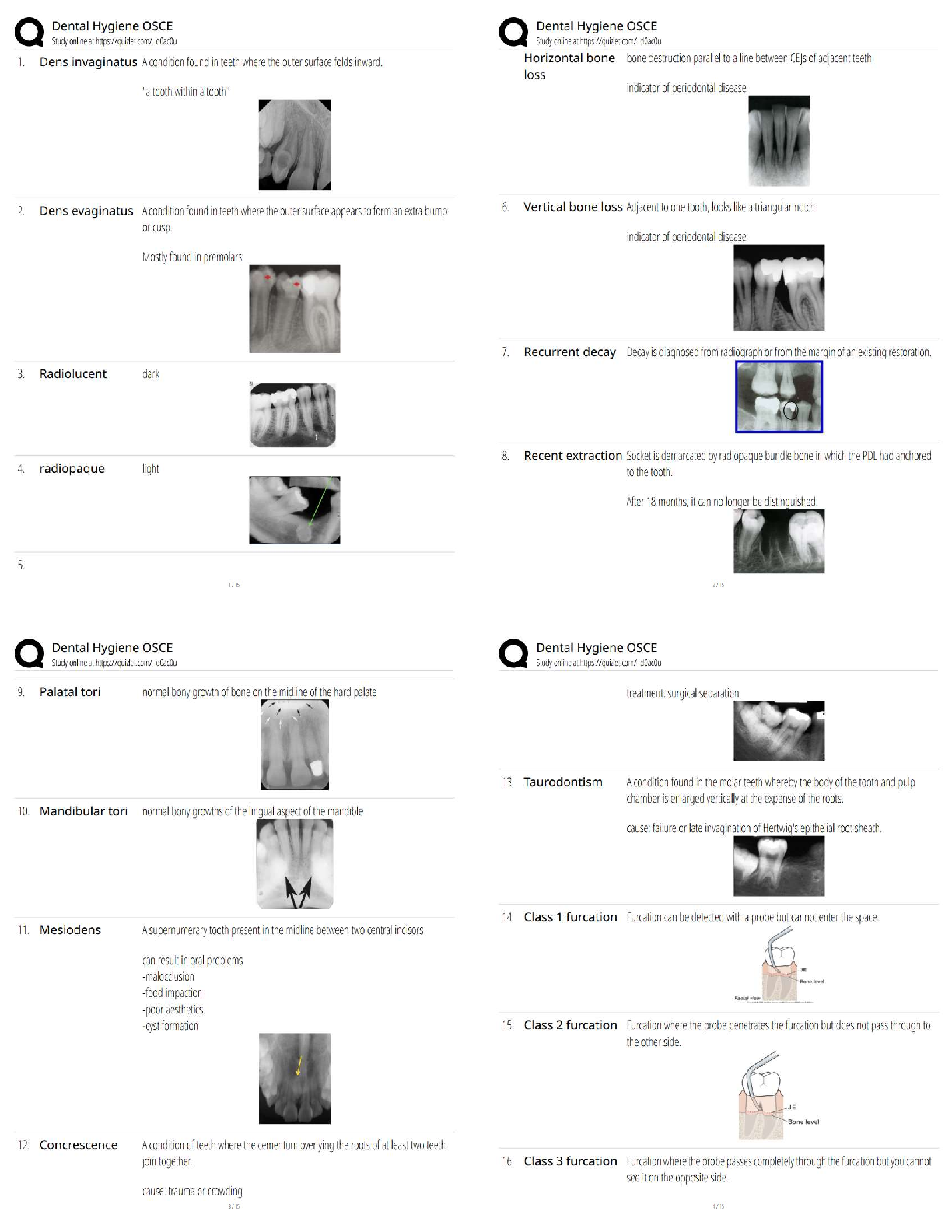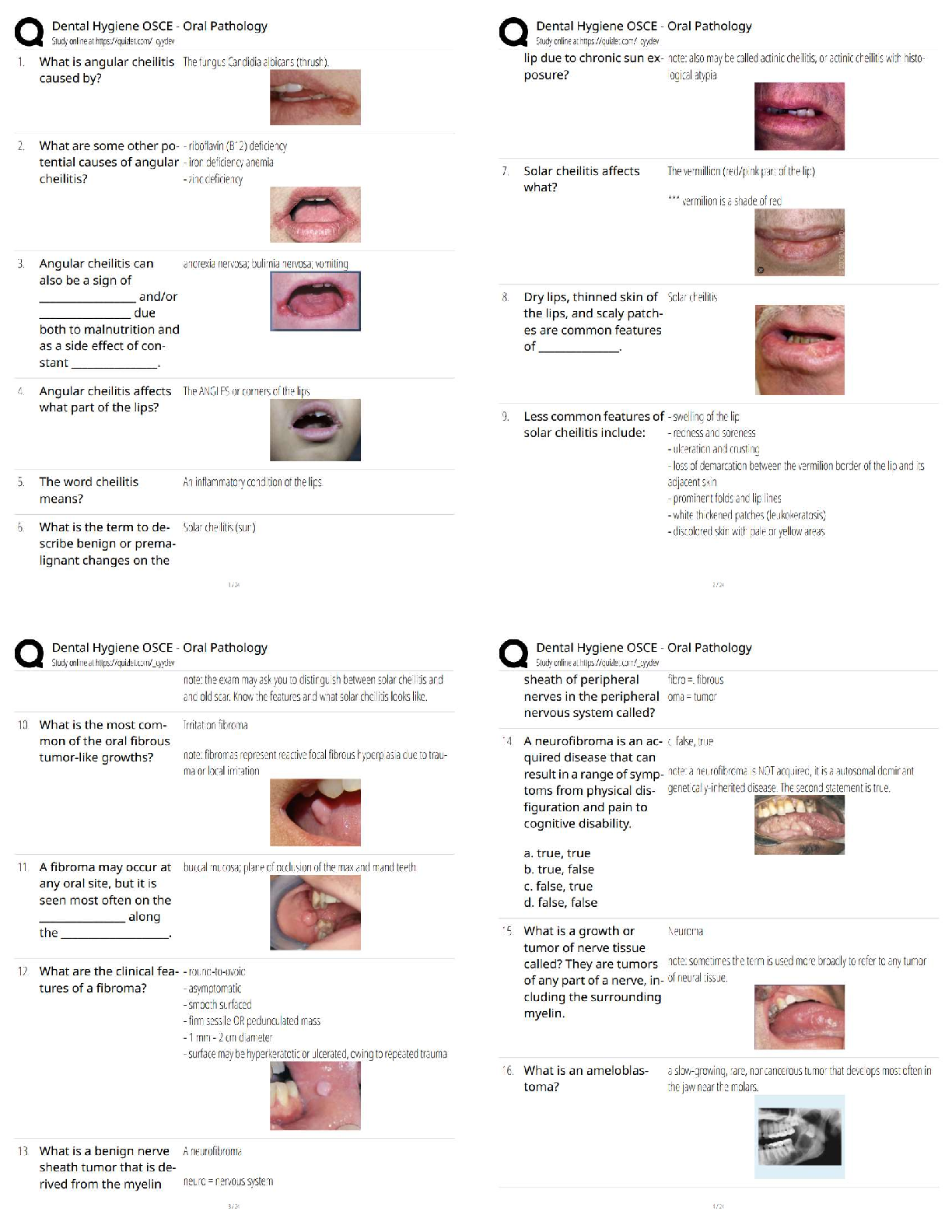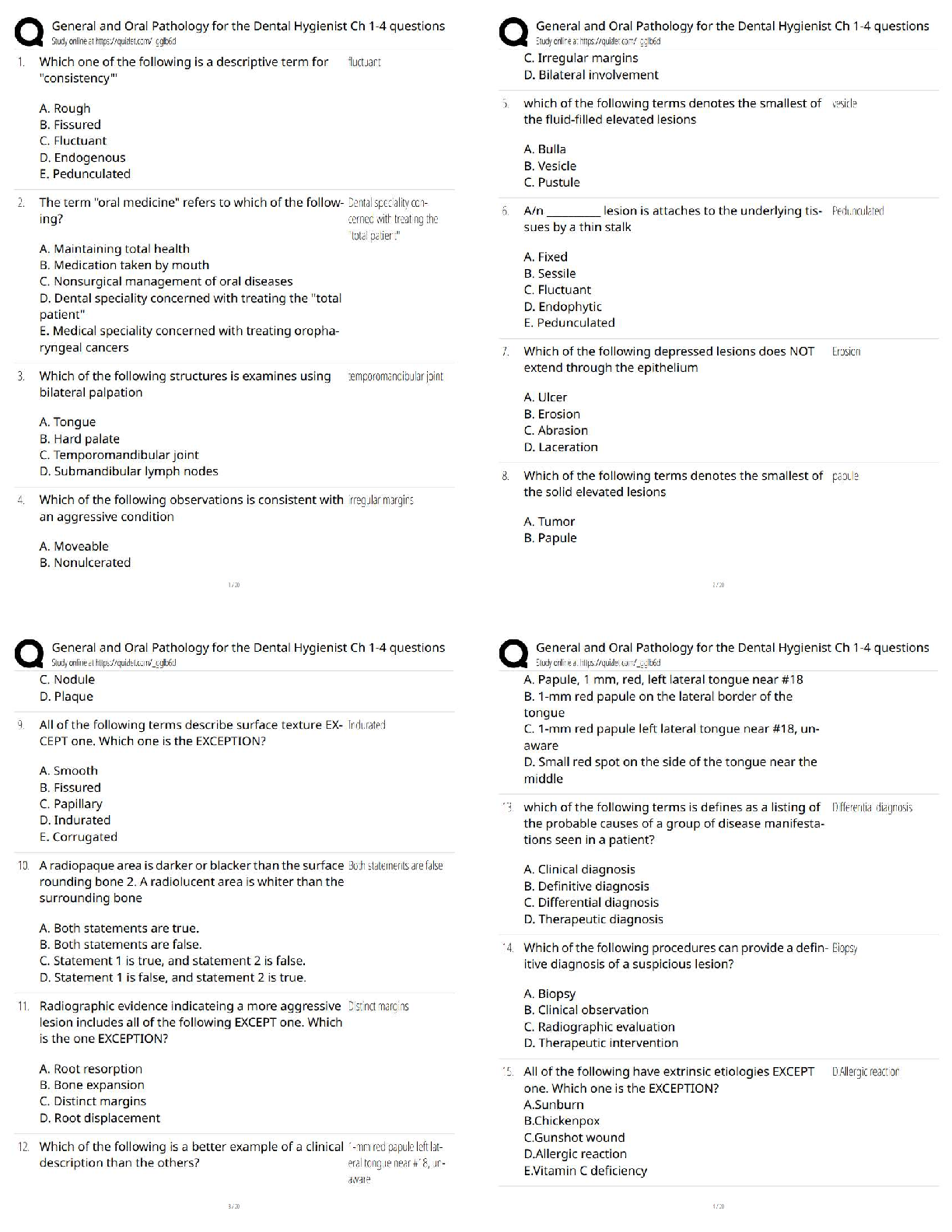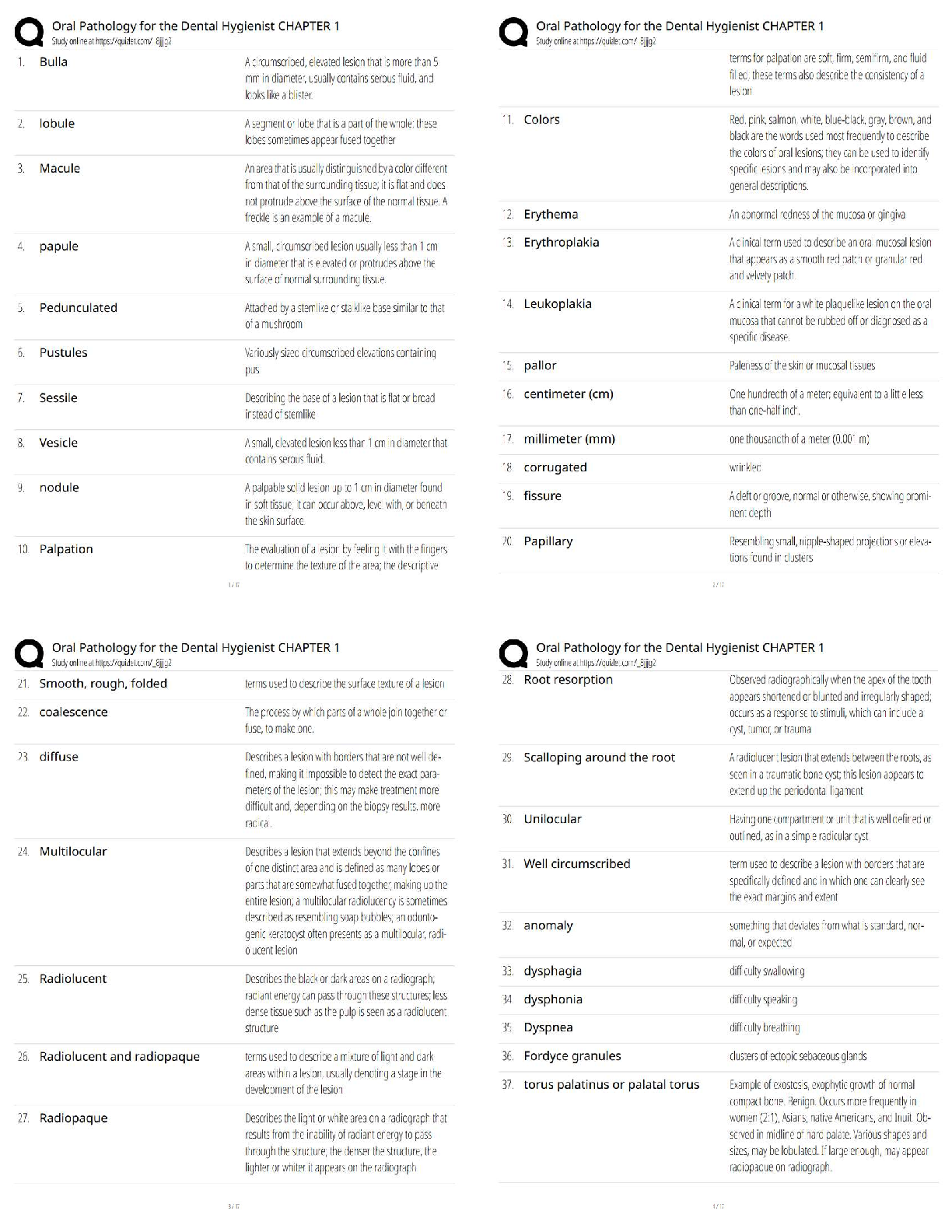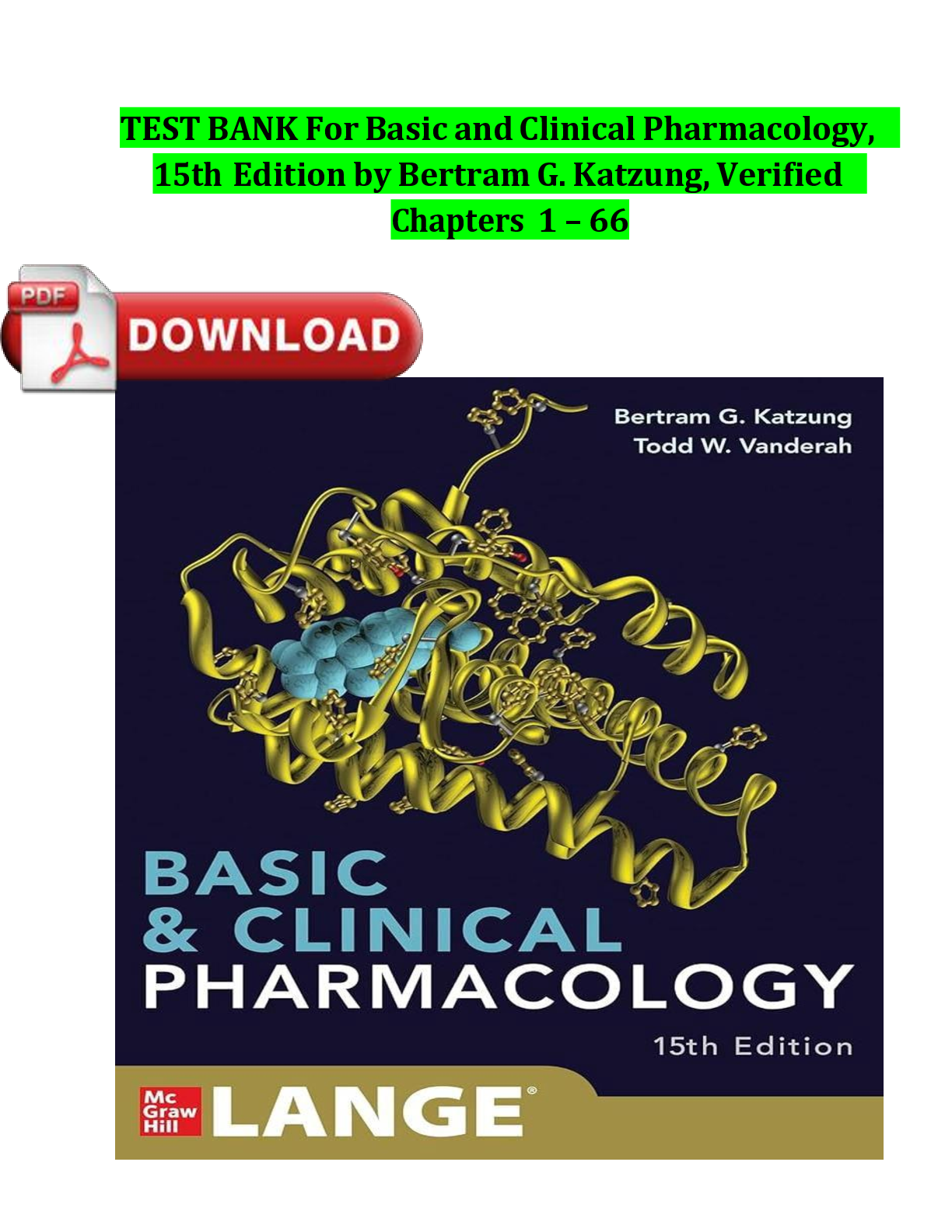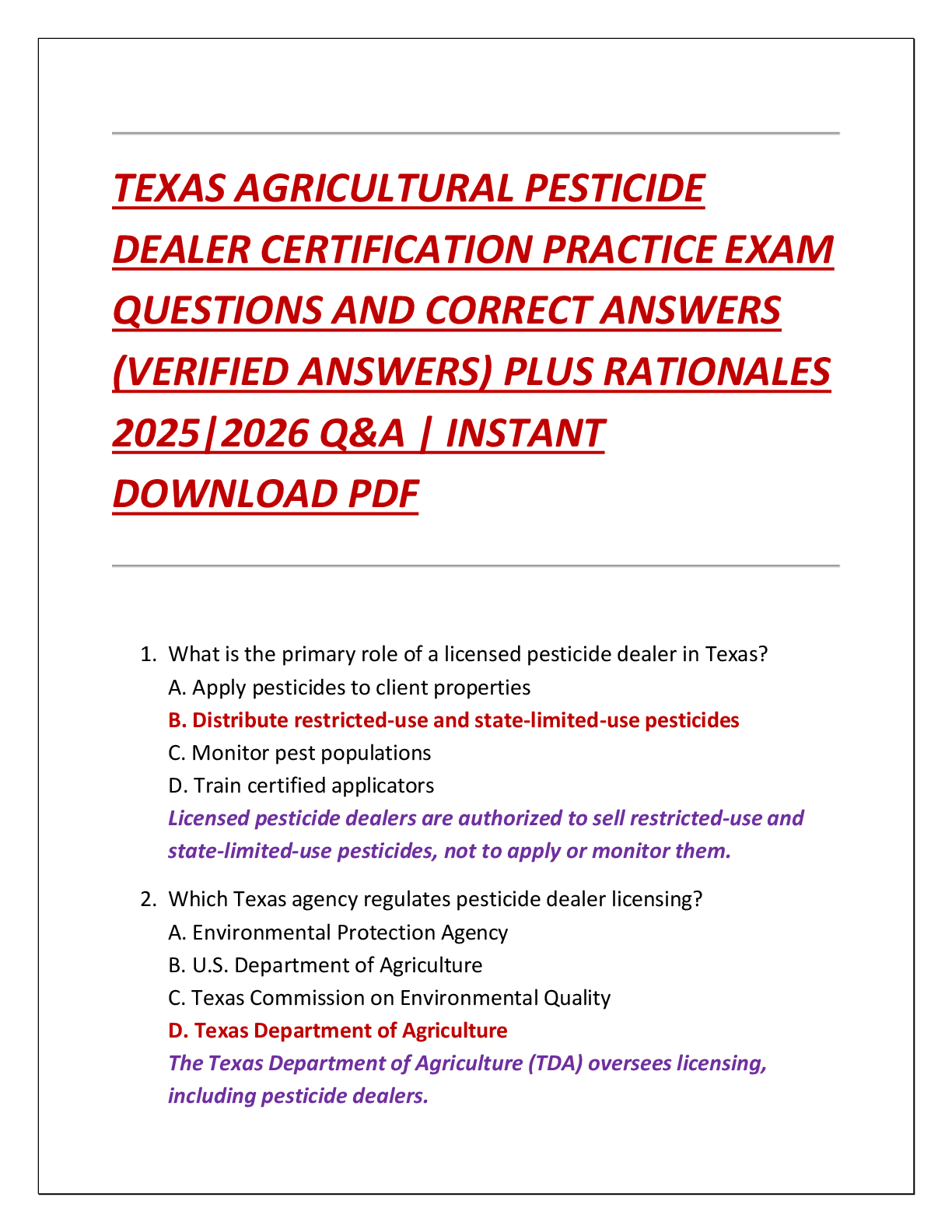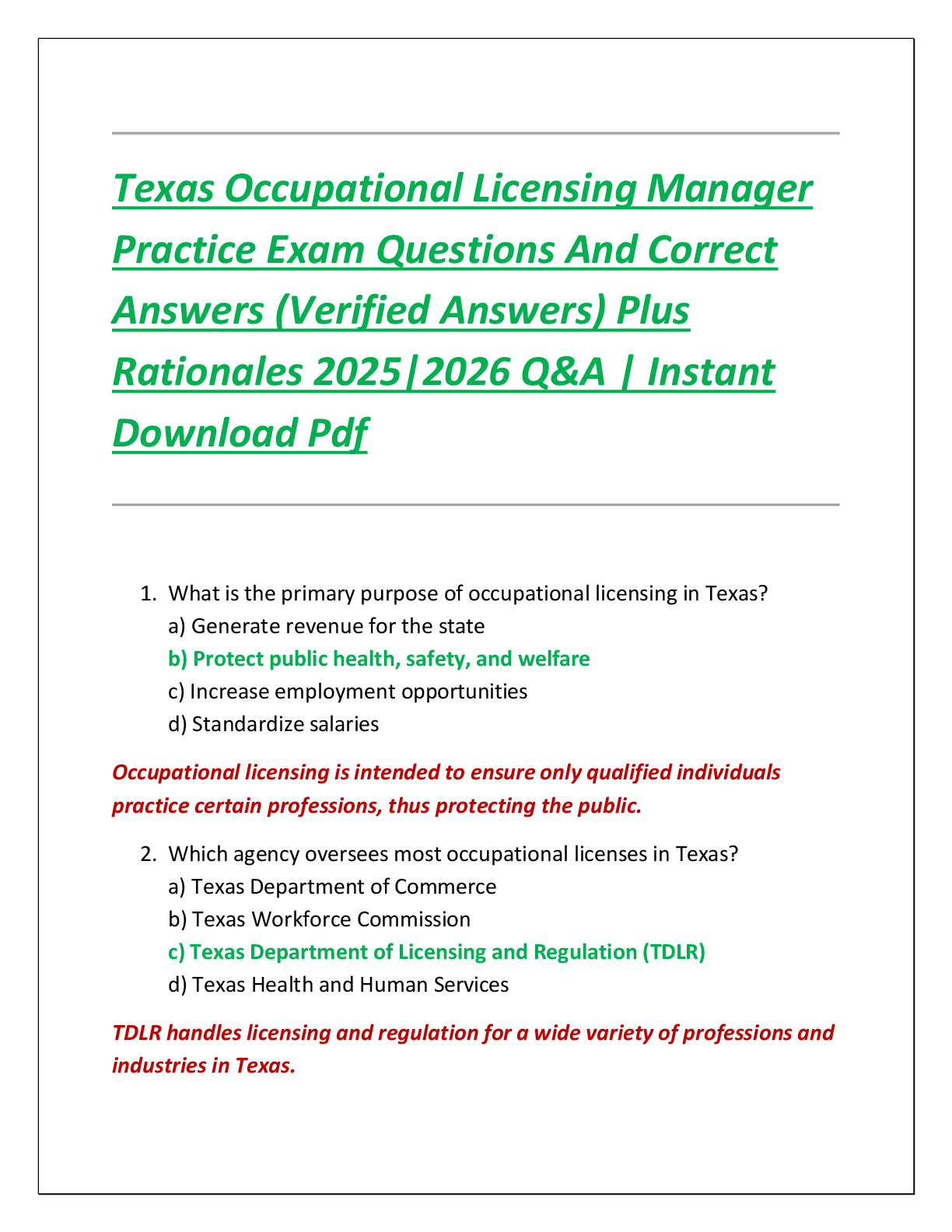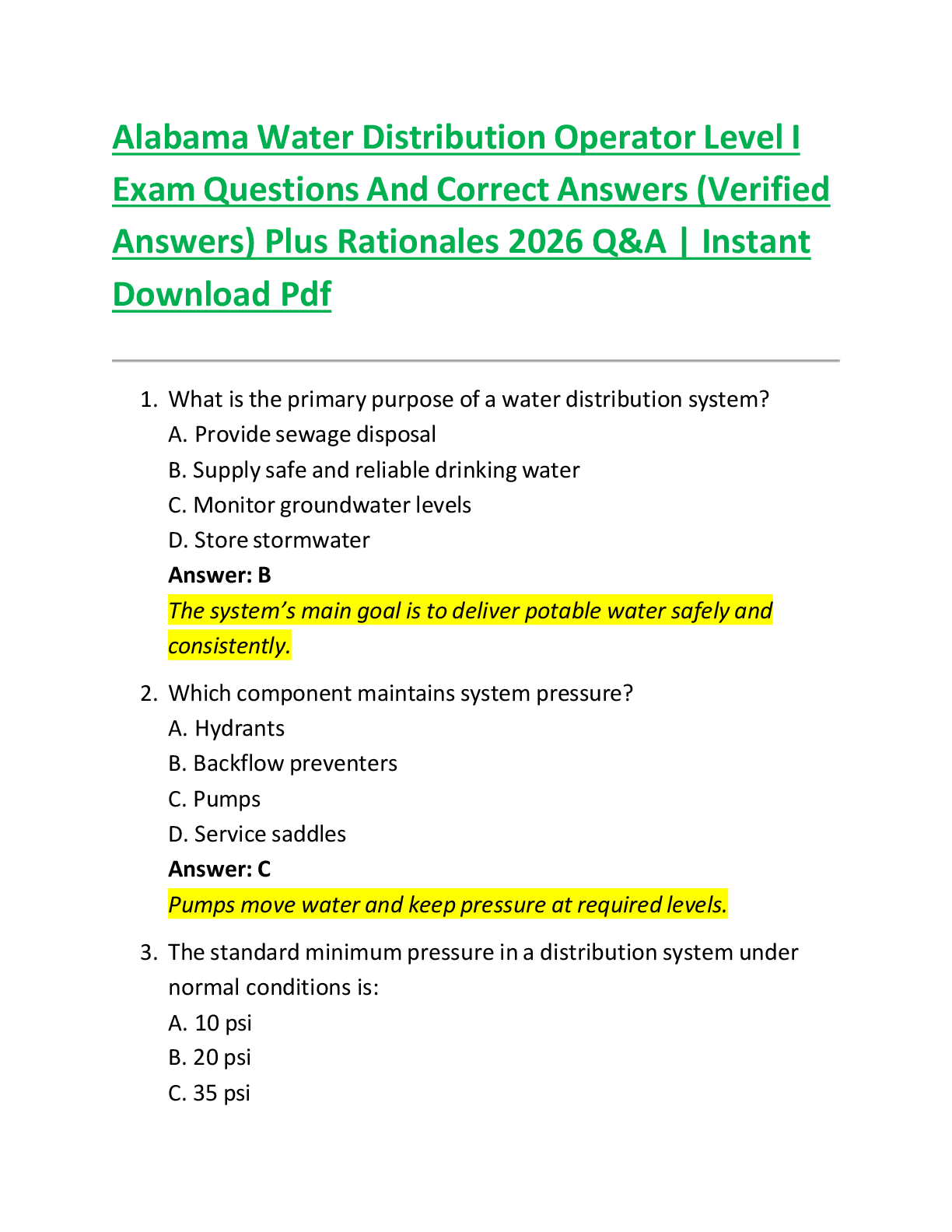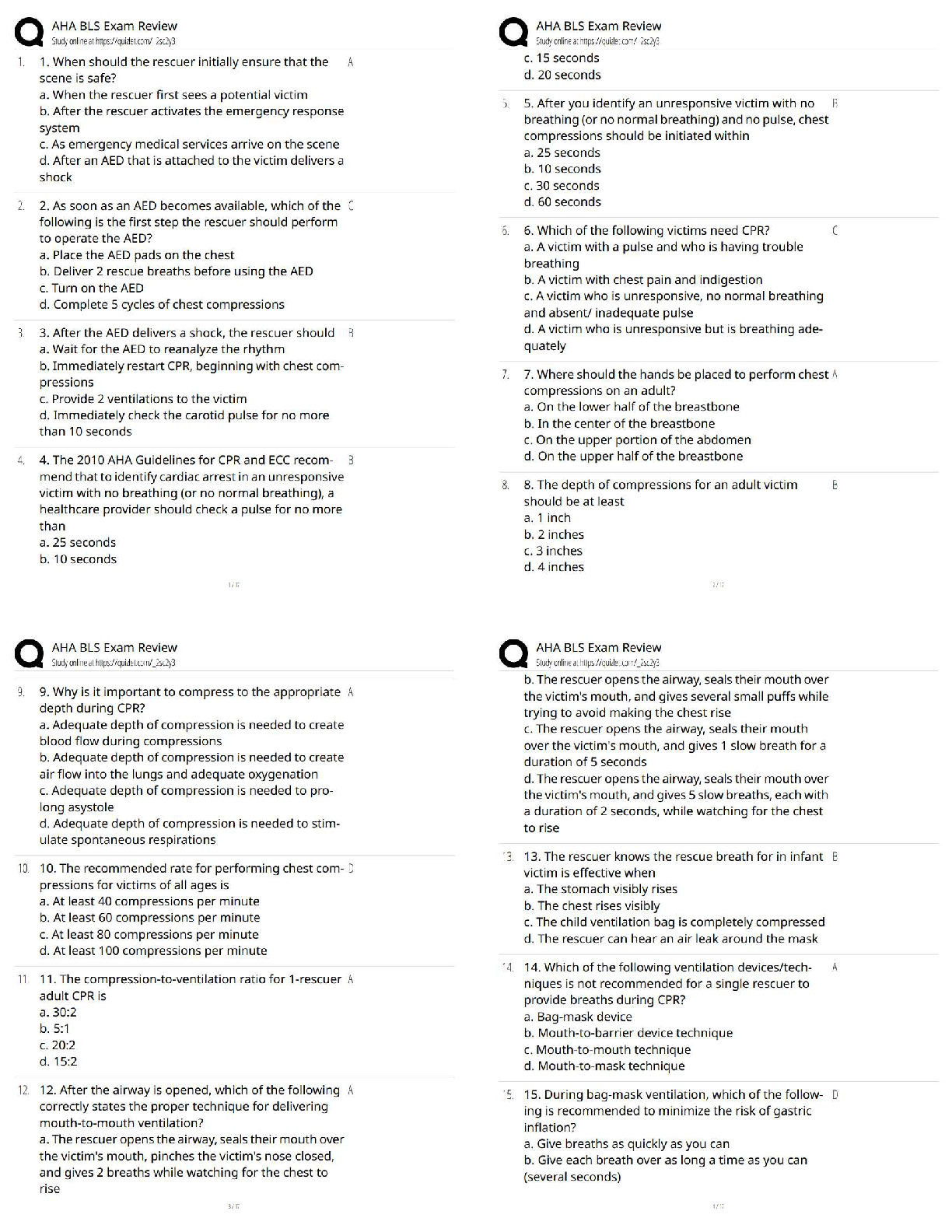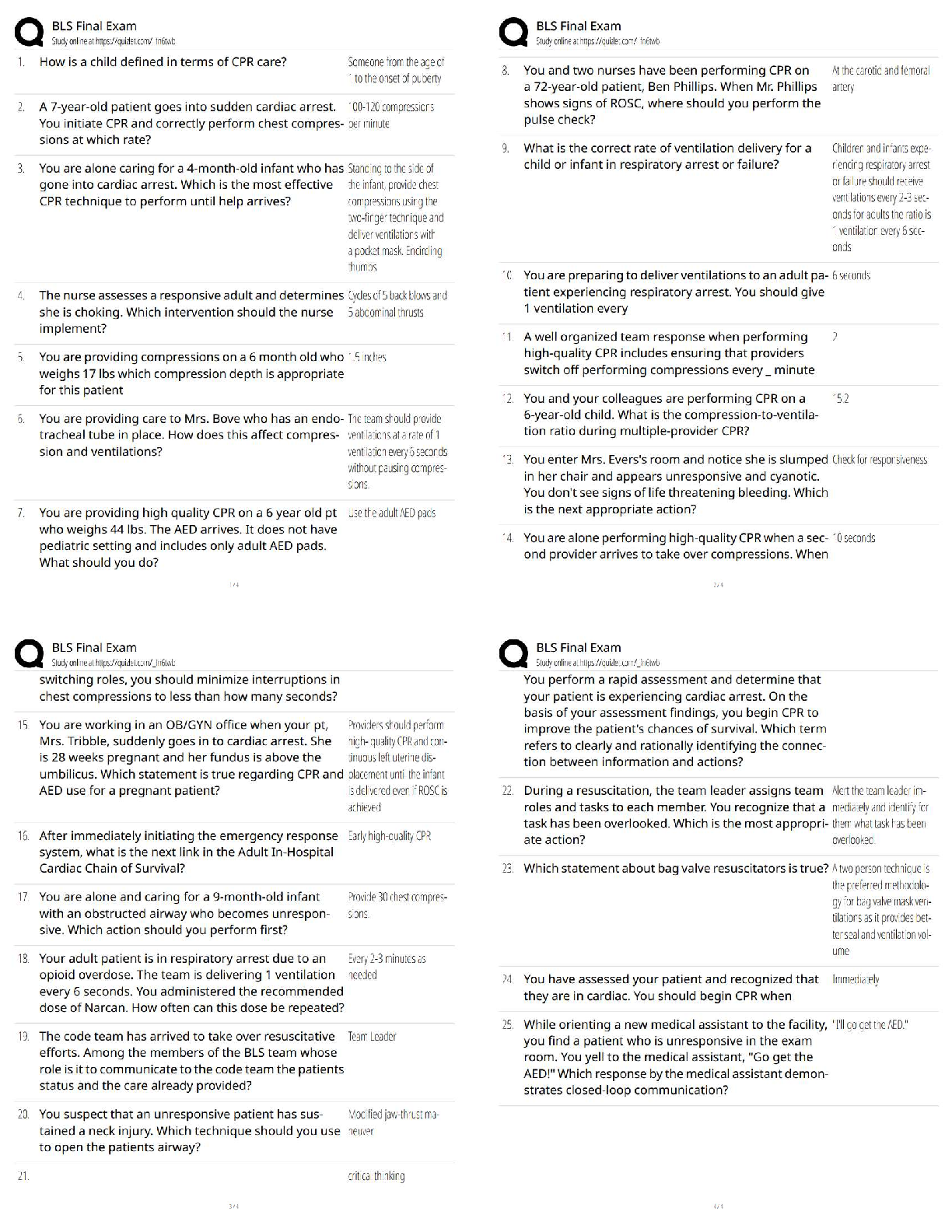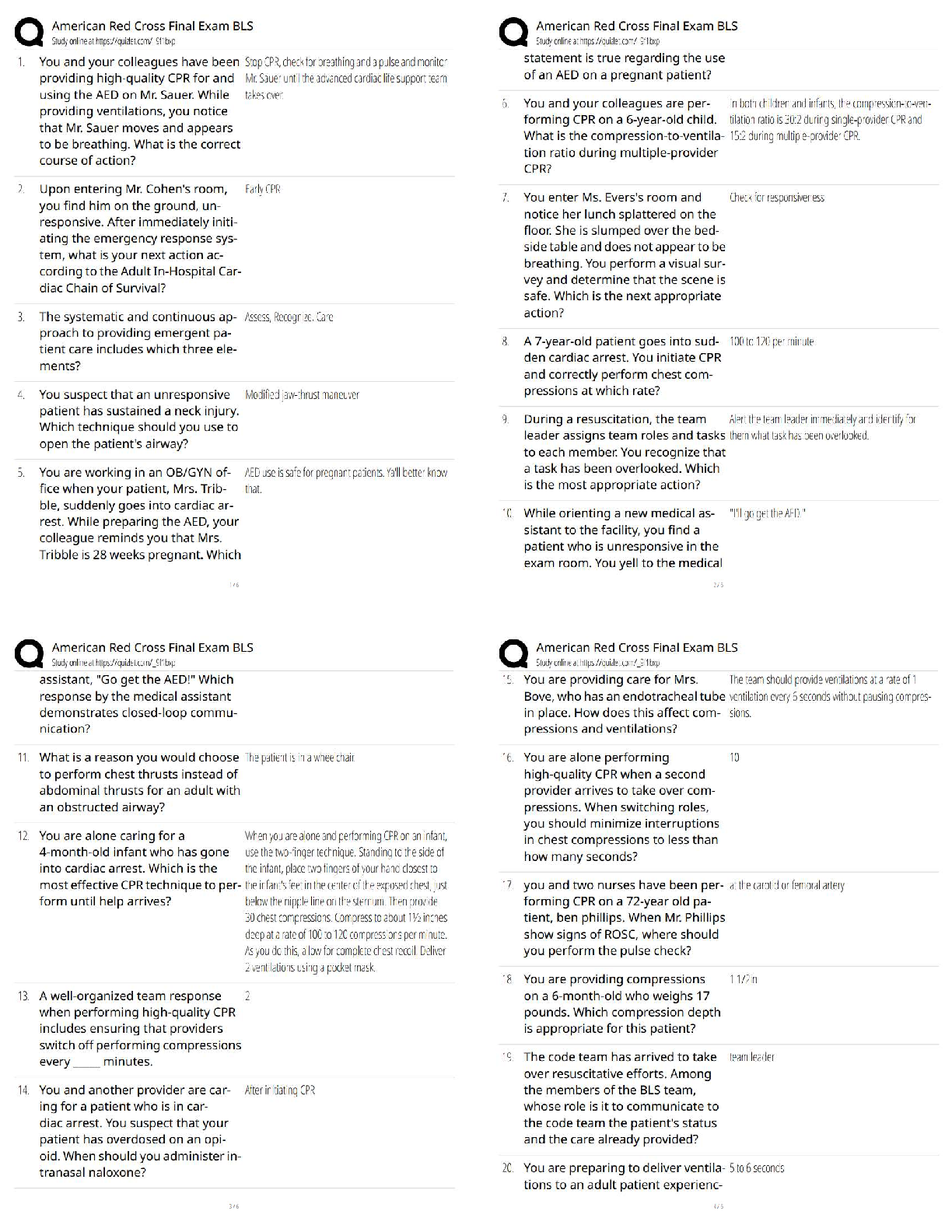*NURSING > QUESTIONS & ANSWERS > Mental Health NCLEX Questions with Answers,100% CORRECT (All)
Mental Health NCLEX Questions with Answers,100% CORRECT
Document Content and Description Below
Question: The nurse is admitting a client with a diagnosis of posttraumatic stress disorder to the mental health unit. The client is confused and disoriented. During the assessment, what is the nurse� ... ��s primary goal for this client? Question: The nurse in the mental health unit is having a conversation with a client … with posttraumatic stress disorder. The client seems upset and looks anxious. What is the appropriate nursing statement the nurse should make to the client? Question: A client with depression is scheduled to receive three sessions of electroconvulsive therapy (ECT). The client asks the nurse about the length of time it will take for improvement in the condition. The nurse should tell the client he or she will see improvement approximately how long after the three treatments? Question: A client has been … with major depression. The nurse notes that the client is not eating adequately and at times refuses to eat. What should the nurse plan to do to meet the client’s nutritional needs? Question: The health care provider has prescribed medication therapy for a client with an alcohol abuse problem to assist in the maintenance of sobriety. The nurse reviews the client’s record and expects to note that which medication has been prescribed? Question: The mental health nurse is caring for a client with a social phobia. The nurse tells the client that a music therapy session has been scheduled as part of the treatment plan. The client tells the nurse that she cannot sing and refuses to attend. What is the appropriate nursing response? Question: The nurse is monitoring a client who has been placed in restraints because of violent behavior. When should the nurse determine that it will … safe to remove the restraints? Question: The mental health nurse is conducting a group therapy session and is monitoring a client with a diagnosis of agoraphobia who has been attending the sessions for several months. The nurse notes that the client is cooperative, sharing with peers, and making appropriate suggestions during group discussions. How should the nurse interpret this behavior? Question: The nurse is preparing a client for electroconvulsive therapy (ECT). The family of the client asks the nurse about this treatment. The nurse responds, knowing that which statements are accurate regarding this treatment? Select all that apply. Question: The nurse is planning a stress management seminar for clients in an ambulatory care setting. Which concept should the nurse plan to include in the content of the seminar? Question: A 15-year-old client who is pregnant and unwed tells the nurse, “My life was unbearable before I met Johnny. My mother beats me up every day, and my dad has been sleeping with me since I was 10 years old!” Which response is appropriate for the nurse to make? Question: A 10-year-old girl who has been referred for evaluation for drawing sexually explicit scenes in her textbooks says to the psychiatric nurse, “I just felt like it.” Which response is therapeutic for the nurse to make in order to assess abuse-related symptoms? Question: During a nursing interview, a client says, “My daughter was murdered in her New York apartment, and her estranged husband called to tell me. I can’t help wondering if he killed her, but the police have eliminated him as a suspect.” Which statement is a therapeutic nursing response? Question: The nurse is assessing a client in the coronary care unit (CCU) who seems to fluctuate in his ability to focus during the day. On the basis of this assessment, which client problem should the nurse suspect? Question: A client with diabetes mellitus is told that amputation of the leg is necessary to sustain life. The client is very upset and tells the nurse, “This is all the health care provider’s fault. I have done everything that he has asked me to do!” How should the nurse interpret the client’s statement? Question: The nurse is planning to formulate a psychotherapy group. Several clients are interested in attending the session. The nurse plans the group, knowing that which is the maximum number of group members that can … included? Question: A nurse assists a client with a diagnosis of obsessive-compulsive disorder (OCD) in his preparations for bedtime. One hour later the client calls the nurse and says that he is feeling anxious; he asks the nurse to sit and talk for a while. Which is the appropriate initial nursing action? Question: A nurse is planning care for a group of clients on a mental health unit. The nurse notes that most of the assigned clients require interventions commonly used to treat anxiety disorders. Such antianxiety interventions would … appropriate for which clients? Select all that apply. Question: A nurse is preparing to admit a client with a diagnosis of obsessive-compulsive disorder (OCD) to the mental health unit. The nurse would expect to note which behaviors in the client? Question: A nurse is performing an assessment on a client admitted to the mental health unit. The client tells the nurse that she cannot leave home without checking numerous times that the iron and coffee pot have been shut off. The client states that this activity makes her late for many functions and that she misses engagements on occasion because of it. The nurse would expect to note which anxiety disorder documented in the client’s record? Question: A nurse is performing an assessment on a client admitted to the mental health unit. The nurse notes that the client’s diagnosis is documented as obsessive-compulsive disorder. The nurse plans care knowing that the client is most likely to experience which type of compulsive behavior? Question: A mental health nurse asks a nurse orientee to describe the underlying pathophysiology associated with acts of compulsion, such as repeated hand washing, performed by clients with obsessive-compulsive disorder (OCD). The nurse determines that the orientee understands this disorder if the orientee identifies which characteristic of the client? Question: A nurse is performing an assessment on a client being admitted to the mental health unit. During the interview, the nurse discovers that the client suffered a severe emotional trauma 1 month earlier and is now experiencing paralysis of the right arm. Which is the initial nursing action? Question: A nurse is developing a plan of care for a client admitted to the mental health unit with a diagnosis of obsessive-compulsive disorder (OCD). What is the nurse’s first priority in the plan of care? Question: A nurse is preparing to develop a care plan for a client admitted to the mental health unit with a diagnosis of obsessive-compulsive disorder (OCD). The nurse should plan to include which component as a priority in the nursing plan of care? Question: A nurse is reviewing the assessment findings documented in the chart of a client who is newly admitted to the mental health unit. The nurse notes that the client has experienced emotional turmoil and is exhibiting signs and symptoms that usually result from a loss of physical functioning, although no such loss can … confirmed medically. The nurse interprets these findings as indicating which condition? Question: The home health nurse visits an older adult client who has recently lost her husband. The client says, “No one cares about me anymore. All the people I loved are dead.” Which is the appropriate response? Question: A depressed client who appeared sullen, distraught, and hopeless a few days ago now suddenly appears calm, relaxed, and more energetic. Which is the nurse’s best initialaction with regard to the client’s altered demeanor? Question: The nurse is performing an assessment on a 16-year-old female client who has been … with anorexia nervosa. Which statement, if made by the client, would the nurse identify as necessitating further assessment on a priority basis? Question: A nurse is assessing a client in crisis and is determining the potential for self-harm. Which assessment data would indicate that the client is at very high risk for suicide? Question: The nurse is planning to instruct a mental health client and his or her family about the importance of medication compliance. The nurse should plan for which interventions that are associated with increased compliance? Question: The nurse is planning care for a client who has been … for violent behavior and is at risk for harming others. Which intervention could potentially present a danger to the client, health care providers, and others on the nursing unit? Question: A nurse who is caring for a client with severe depression is planning activities for the client. The nurse goes to the activity room and finds a puzzle; a checkerboard game; a paint-by-number picture; and crayons, colored pencils, and paper for drawing. Which activity would … most appropriate for this client? Question: The nurse is developing a plan of care for a client who is scheduled to have electroconvulsive therapy (ECT). Which problem is a priority for this client? Question: A female client in a manic state emerges from her hospital room. She is topless and is making sexual remarks and gestures toward the staff and other clients. Which is the best initial nursing action? Question: A nurse is monitoring a group therapy session. During this session the members are identifying tasks and boundaries. The nurse determines that these activities are characteristic of which stage of group development? Question: When planning discharge care for a client with bipolar disorder, the nurse determines theneed for further teaching when the client makes which statement? Question: A client has consented to participate in Alcoholics Anonymous (AA) community groups after discharge from the hospital. The nurse is monitoring the client’s response to the substance abuse sessions. Which statement by the client best reflects the development of an effective coping response style and effective processing of information for self-use? Question: Question: A client who is on lithium carbonate will … discharged at the end of the week. In formulating a discharge teaching plan, the nurse should include which precaution? Question: The home health nurse visits an agoraphobic client who experiences panic attacks. Which statement by the client would indicate a therapeutic response to behavioral and pharmacological treatment? Question: The psychiatric home care nurse visits a client with a phobia who experiences panic attacks. The nurse teaches the client to use paradoxical intention and employs which method to teach the client this form of therapy? Question: A client tentatively … with a borderline personality disorder says to the nurse, “I don’t know why I got my tattoo; it was for me. OK? Sometimes I do these things to get my parents mad, and sometimes I do them because I’m bored. That’s what happened the night I crashed the family car. I wasn’t drunk or suicidal or anything like the police thought. It was just for kicks!” Which is the appropriate nursing response? Question: The nurse is reviewing the medical record of a client who received electroconvulsive therapy (ECT) in the past. Which assessment data would indicate to the nurse the presence of long-term retrograde amnesia in the client? Question: The mother of a teenage client with an anxiety disorder is concerned about her daughter’s progress on discharge. She states that her daughter stashes food, eats all the foods that make her hyperactive, and hangs out with the “wrong crowd.” In helping the mother prepare for her daughter’s discharge, what instruction should the nurse provide? Question: The nurse is reviewing the record of a client scheduled for electroconvulsive therapy (ECT). Which medical diagnosis, if noted on the client’s record, would indicate a need to contact the health care provider scheduled to perform the ECT? Question: A woman who is a victim of family violence is now engaged in group therapy sessions. She begins yelling at another client during the therapy session and screams, “I can’t listen to this. You people are no different from the ones at home.” The client stands up and tips the chair over backward. What is the nurse’s immediate action? Question: A client … in the mental health unit with depression is preparing to … discharged to outpatient status. The nurse is discussing termination and follow-up plans with the client. Which client statement would most concern the nurse about the client’s discharge and indicate the need for follow-up treatment? Question: During a support group session for battered women, a client says, “I was abused by my father and then my husband, so I finally stabbed my husband when he came after me, but no one on the jury believed me “cause my husband, the ‘big shot,’ can lie to anyone and … believed.” If no one in the group responds, which statement is the therapeutic response by the nurse? Question: The nurse is caring for a client with Alzheimer’s disease who is having difficulty recognizing objects that are well known, including people. The nurse determines that the client is experiencing which problem? Question: A client with schizophrenia says to the nurse, “Will you protect me from the Grand Duchess?” and points to an older client who is sitting reading a book. Which statement is the therapeutic response by the nurse? Question: The night nurse reported to the nurse manager that a client was admitted to the mental health unit after attacking his father with an iron for interrupting him at his computer. During nursing rounds, this client interrupts the nurse manager and says, “I need to get out of here, so I can work on my computer project to save the world!” Which statement is a therapeutic response by the nurse manager? Question: The nurse is performing a mental status examination on a client, and the client states, “Glass breaks if you throw stones or shoot at it with a gun. My cousin shoots guns at the police all the time at target practice. People who live in glass houses shouldn’t throw stones.” Which interpretation by the nurse is appropriate? Question: The nurse is caring for a client with schizophrenia who states, “I decided not to take my medication because I realize that it really can’t help me. Only I can help me.” Which nursing response would … therapeutic? Question: A nursing student is asked to identify suicide methods that are referred to as soft methods. The nursing instructor determines that the student understands the subject if he or she states that which is a soft method? Question: The nurse in a mental health clinic is reviewing the records of the clients to … seen that day. The nurse determines that which client is at highest risk for suicide? Question: The spouse of an alcoholic client is attending a support group and says to the group members, “It’s all very well for everyone to label me an enabler, but if I didn’t call him in sick at work, he’d lose his job. Where would we … then?” Which statement by the nurse co-leader would be therapeutic? Question: A heroin-addicted client who is taking methadone hydrochloride (Dolophine) discontinues the methadone without consulting the health care provider. The client says to the nurse, “I thought I didn’t need the methadone after 1 year. I had a job and was even saving money. I can’t believe I ruined everything.” Which statement by the nurse is therapeutic? Question: An alcohol-troubled client says, “The 12 Steps of Alcoholics Anonymous (AA) freak me out. I had to go for a drink after 1 hour with those people; they’re fanatics!” Which statement by the nurse would … therapeutic? Question: A 37-year-old client who is recovering from benzodiazepine dependence says, “I think I’ve walked under a black cloud. I’ve lost so many people. First, my brother dies of the big C; then my husband leaves me for a 20-year-old bimbo. I wish I had a Xanax right now.” Which statement by the nurse would … therapeutic? Question: The husband of an alcohol-troubled wife says, “If anyone had said I’d … henpecked, I’d have called them a liar, but now I realize that I’m codependent.” Which statement by the nurse would be therapeutic? Question: A 45-year-old client states that he used to drink a cocktail nightly after work and also had a drink with his meal. Now he has two drinks before dinner and two or three more drinks during his meal. As the client continues to describe his alcohol intake, the nurse discovers that he also has added a couple of drinks at night to help him sleep. Which is the most accurate assessment of his alcohol consumption? Question: A battered wife says, “My husband never beat me up, so I didn’t think he was abusive even after he lost all our money through bad deals, bullying me into his schemes, gambling, womanizing, and now not holding a real job with benefits. I still let him refinance our mortgage, take money out of the bank, and put the house in his name.” Which statement by the nurse is therapeutic? Question: An 80-year-old resident in a long-term care facility prepares to walk out into a rainstorm after saying, “My father is waiting to take me for a ride.” Which is the appropriate response by the nurse? Question: A client who is exhibiting psychotic behaviors is admitted to the psychiatric unit. In developing a plan of care, the nurse should identify which as the priority client problem? Question: The nurse is developing a daily care program for a depressed client who was just admitted to the mental health unit. Which is the best approach when planning activities for this client? Question: A client with a history of panic disorder comes to the emergency department and states to the nurse: “Please help me—I think I’m having a heart attack.” What is the priority nursing action? Question: The nurse reviews the assessment data of a client admitted to the hospital with a diagnosis of anxiety. The nurse should assign priority to which assessment finding? Question: A home care nurse suspects that a client’s spouse is experiencing caregiver strain. Which nursing action will assist in supporting the nurse’s suspicion? Question: A client who has a history of being sexually assaulted is admitted to a psychiatric unit for self-mutilation. She is found sucking her thumb while rocking in her bed and does not respond to verbal communication. The nurse should recognize that this behavior demonstrates which coping mechanism? Question: A client is being evaluated for possible antisocial personality disorder. Which behavior is expected of a client with this disorder? Question: The client with a diagnosis of dependent personality disorder is most likely to have problems coping with which issue? Question: Which piece of subjective data obtained during assessment of a severely anxious client would indicate the possibility of posttraumatic stress disorder? Question: A client admitted to the hospital at the beginning of the nursing shift with a diagnosis of alcohol dependence tells the nurse that she had her last drink 6 hours ago. The nurse expects which finding based on knowledge of time for appearance of withdrawal symptoms? Question: Thiamine supplementation and other nutritional vitamin support measures are prescribed for clients who have been using alcohol to prevent or decrease the risk of which complication? Question: Which mental health professional is responsible for the milieu in an inpatient psychiatric setting? Question: Which best describes the purpose of behavioral therapy? Question: The client experiencing a great deal of stress and anxiety is being taught to use self-control therapy. Which statement by the client indicates a need for further teaching about the therapy? Question: Laboratory work is prescribed for a client who has been experiencing delusions. When the nurse approaches the client to obtain a specimen of blood, the client begins to shout, “You’re all vampires. Let me out of here!” Which is the appropriate nursing response? Question: A supervisor reprimands the nurse in charge of the nursing unit because the charge nurse has not adhered to the unit budget. Later that afternoon the charge nurse accuses the nursing staff of wasting supplies. What type of behavior is this an example of? Question: A client comes to the emergency department following an assault and is extremely agitated, trembling, and hyperventilating. What is the appropriate initial nursing action? Question: A client comes to the emergency department following an assault and is extremely agitated, trembling, and hyperventilating. What is the appropriate initial nursing action? Question: A woman comes into the emergency department following an assault. She presents with hyperventilation, pacing, rapid speech, and headache. Which level of anxiety should the nurse assess that the client is experiencing? Question: A nurse is developing a plan of care for the client who is upset following the loss of a job. The client is verbalizing concerns regarding the ability to meet financial obligations. Which is the appropriate client problem? Question: A client arrives in the emergency department in a crisis state. The client demonstrates signs of profound anxiety and is unable to focus on anything but the object of the crisis and the effect on self. Which item should the initial nursing assessment focus on? Question: A clinic nurse is monitoring a client with anorexia nervosa. Which statement, if made by a client, should indicate to the nurse that treatment has been effective? Question: A client with a history of anxiety appears to … in the second phase of crisis response. The nurse prepares for the possibility that which will occur? Question: Which is the primary goal of crisis intervention therapy? Question: Which statement, if made by a client who has recently experienced an emotional crisis, ismost likely to assure the nurse that she has returned to her pre-crisis level of functioning? Question: A homeless shelter has sustained severe damage as a result of a fire, and most of the structure and people’s belongings were destroyed. Ten of the individuals who are being displaced have a history of chronic mental illness. The mental health team coordinating support initially should focus their efforts on which action? Question: A small rural community has experienced a hurricane that has destroyed 65% of the homes and businesses in the area. Community mental health teams recognize that in the immediate post-disaster period, the most effective means of identifying individuals experiencing difficulty coping psychologically with the disaster is to take which action? Question: The nurse is preparing a care plan for a client exhibiting negative symptoms of schizophrenia. Which are indicative of negative symptoms? Select all that apply. Question: The nurse caring for a client … with schizophrenia should include which interventions into the plan of care to assist in managing the client’s concrete thinking? Question: The nurse understands that schizophrenia hinders a client’s cognitive ability to appropriately process data from external stimuli. This dysfunctional processing can result in which problem? Question: During the admission assessment process, the nurse observes that a client with paranoid schizophrenia has multiple dental caries and mouth ulcers. The client denies oral pain or difficulty eating and does not present any concern over the nurse’s finding. The nurse recognizes the client’s response as most likely the result of which client factor? Question: A client who is watching television in the dayroom shares with the nurse that he has begun seeing his mother being assaulted on the television screen. Which is the nurse’s initial intervention? Question: The nurse is planning relapse prevention information for a client with schizophrenia who is being discharged. The nurse understands that it is important to ensure which primaryintervention in the plan whenever possible? Question: A depressed client verbalizes feelings of low self-esteem and self-worth typified by statements such as, “I’m such a failure. I can’t do anything right.” Which is the best nursing response? Question: The history assessment of a client … with schizophrenia confirms a routine that includes smoking two packs of cigarettes and drinking 10 cups of coffee daily. The nurse recognizes that which is the greatest risk for injury these behaviors present for this client? Question: The nurse should identify which best goal for a client experiencing hallucinations? Question: The parents of a young adult have expressed concerns about the cognitive and emotional changes they have noted in their child. The nurse recognizes which assessment and diagnostic data as associated with the diagnosis of schizophrenia? [Show More]
Last updated: 3 years ago
Preview 1 out of 1 pages

Buy this document to get the full access instantly
Instant Download Access after purchase
Buy NowInstant download
We Accept:

Reviews( 0 )
$35.00
Can't find what you want? Try our AI powered Search
Document information
Connected school, study & course
About the document
Uploaded On
Jul 09, 2020
Number of pages
1
Written in
All
Additional information
This document has been written for:
Uploaded
Jul 09, 2020
Downloads
0
Views
185



